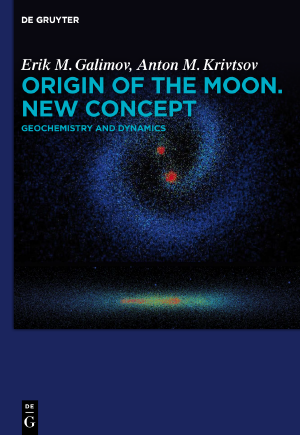Difference between revisions of "Origin of the Moon. New Concept"
m (→See also) |
|||
| (2 intermediate revisions by 2 users not shown) | |||
| Line 1: | Line 1: | ||
| − | [[A. Krivtsov]] > [[Anton Krivtsov: Selected publications|Selected publications]] > [[Origin of the Moon. New Concept|Origin of the Moon]] <HR> | + | [[A.M. Krivtsov]] > [[Anton Krivtsov: Selected publications|Selected publications]] > [[Origin of the Moon. New Concept|Origin of the Moon]] <HR> |
[[File:Galimov_Krivtsov_2012_cover.png|thumb|left]] | [[File:Galimov_Krivtsov_2012_cover.png|thumb|left]] | ||
| Line 7: | Line 7: | ||
The origin of the Moon remains an unsolved problem of the planetary science. Researchers engaged in celestial dynamics, geophysics, and geochemistry are still discussing various models of creation of our closest cosmic neighbour. The most popular scenario, the impact hypothesis involving a collision early in the Earth's history, has been substantially challenged by the new data. The birth and development of a planet-moon system always plays a role in the formation of an entire planetary system around our Sun or around another star. This way, the story of our Moon acquires broader ramifications for one of the hottest topics of the modern scholarship. All this has motivated the authors of this book to consider a new concept and to compare the currently discussed theories, analyzing their advantages and shortcomings in explaining the experimental data. | The origin of the Moon remains an unsolved problem of the planetary science. Researchers engaged in celestial dynamics, geophysics, and geochemistry are still discussing various models of creation of our closest cosmic neighbour. The most popular scenario, the impact hypothesis involving a collision early in the Earth's history, has been substantially challenged by the new data. The birth and development of a planet-moon system always plays a role in the formation of an entire planetary system around our Sun or around another star. This way, the story of our Moon acquires broader ramifications for one of the hottest topics of the modern scholarship. All this has motivated the authors of this book to consider a new concept and to compare the currently discussed theories, analyzing their advantages and shortcomings in explaining the experimental data. | ||
<br style="clear: both" /> | <br style="clear: both" /> | ||
| + | |||
| + | == Related publications == | ||
| + | |||
| + | * A.A. Le-Zakharov and A.M. Krivtsov. '''Development of algorithms for computing the collisional dynamics of gravitating particles to simulate the formation of the earth-moon system through the gravitational collapse of a dust cloud''' / Problems of biosphere origin and evolution. Editor: Eric M. Galimov. [http://www.novapublishers.com Nova Science Publishers], NY: 2012, pp. 317-329 from 565. | ||
| + | |||
| + | * [[:ru: С.В. Васильев|S.V. Vasil’ev]], [[А.М. Кривцов|A.M. Krivtsov]], E.M. Galimov. '''Study of the planet-satellite system growth process as a result of the accumulation of dust cloud material''' // Solar System Research, 2011, 45(5), pp.410-419 Eng. [[Media:Vasil'ev_2011_SSR.pdf|338 Kb]]) | ||
| + | |||
| + | *E.M. Galimov '''Formation of the Moon and the Earth from a common supraplanetary gas-dust cloud''' (lecture presented at the XIX all-Russia symposium on isotope geochemistry on November 16, 2010) // Geochemistry International 49, no. 6 (2011): 537-554. Eng. [[Media:Galimov_2011_Geoch_Eng.pdf|573 Kb]] | ||
| + | |||
| + | *E.M. Galimov, [[A.M. Krivtsov]], A.V. Zabrodin, M.S. Legkostupov, T.M. Eneev, and Yu I. Sidorov. '''Dynamic model for the formation of the Earth-Moon system''' // Geochemistry International 43, no. 11 (2005): 1045-1055, Eng. [[Media:Galimov_2005_Geoch_Eng.pdf|1176 Kb]] | ||
== See also == | == See also == | ||
| − | + | * [[Satellite Polytech]] | |
* [http://www.degruyter.com/view/product/182768?rskey=daJlNb&result=2&q= Page of the book on the site of the publishing house] | * [http://www.degruyter.com/view/product/182768?rskey=daJlNb&result=2&q= Page of the book on the site of the publishing house] | ||
* [[Anton Krivtsov: Selected publications]] | * [[Anton Krivtsov: Selected publications]] | ||
Latest revision as of 17:02, 9 June 2016
A.M. Krivtsov > Selected publications > Origin of the MoonE.M. Galimov, A.M. Krivtsov. Origin of the Moon. New Concept. Geochemistry and Dynamics. - De Gruyter. 2012. - 168 p.
The origin of the Moon remains an unsolved problem of the planetary science. Researchers engaged in celestial dynamics, geophysics, and geochemistry are still discussing various models of creation of our closest cosmic neighbour. The most popular scenario, the impact hypothesis involving a collision early in the Earth's history, has been substantially challenged by the new data. The birth and development of a planet-moon system always plays a role in the formation of an entire planetary system around our Sun or around another star. This way, the story of our Moon acquires broader ramifications for one of the hottest topics of the modern scholarship. All this has motivated the authors of this book to consider a new concept and to compare the currently discussed theories, analyzing their advantages and shortcomings in explaining the experimental data.
Related publications[edit]
- A.A. Le-Zakharov and A.M. Krivtsov. Development of algorithms for computing the collisional dynamics of gravitating particles to simulate the formation of the earth-moon system through the gravitational collapse of a dust cloud / Problems of biosphere origin and evolution. Editor: Eric M. Galimov. Nova Science Publishers, NY: 2012, pp. 317-329 from 565.
- S.V. Vasil’ev, A.M. Krivtsov, E.M. Galimov. Study of the planet-satellite system growth process as a result of the accumulation of dust cloud material // Solar System Research, 2011, 45(5), pp.410-419 Eng. 338 Kb)
- E.M. Galimov Formation of the Moon and the Earth from a common supraplanetary gas-dust cloud (lecture presented at the XIX all-Russia symposium on isotope geochemistry on November 16, 2010) // Geochemistry International 49, no. 6 (2011): 537-554. Eng. 573 Kb
- E.M. Galimov, A.M. Krivtsov, A.V. Zabrodin, M.S. Legkostupov, T.M. Eneev, and Yu I. Sidorov. Dynamic model for the formation of the Earth-Moon system // Geochemistry International 43, no. 11 (2005): 1045-1055, Eng. 1176 Kb
